On one hand, you have a conventionally grown apple. Furthermore, an organic apple. Both apples are firm, shiny and red. Both provide vitamins and fiber, and both are free of fat, sodium and cholesterol but the price of organic is more expensive.
How do they differ?
The term “organic” has to do with the methods used to grow and process agricultural products – fruits, vegetables, cereals, meat and dairy products.
Organic food means those produced without the use of chemical fertilizers and pesticides , or in the case of animal products, without the use of hormones and antibiotics . Also be processed without irradiation or chemical additives and are not available to organisms genetically modified .
The purpose of this is to prevent these chemicals and additives in food are filtered, so that eventually reach the body of people who consume those foods. Proponents of organic farming also claim that their methods allow the development of more nutrients in the soil, which in theory should increase the nutritional content of organically grown foods.
Does science verifies that organically grown foods are higher in nutrients?
A meta-analysis of over 237 studies done on organic foods vs conventional conducted at Stanford University concluded that organic foods were higher in nutrient values than their non-organic. The results showed no difference in the nutritional content of both.
All studies were conducted with humans but none, say the scientists, lasted more than two years why can not draw conclusions about the long-term impact .
The results support the findings of other research conducted in 2009 by the Food Standards Agency (FSA) in the UK over the claims of organic products industry.
That study found that if there were any nutritional differences in nutrient levels of organic and conventional foods but were not large enough to have a relevance to the public.
The study also concluded that organic products contain mainly higher levels of phosphorus than conventional products, but the researchers said, is data that provide no health benefit as this mineral is obtained sufficient quantities through the daily diet.
Logically, environmentalists disagree with the study results. There are many studies that claim that organic products are more nutritious.
In addition, other studies comparing fresh food (organic and conventional) and show that the ecological have higher concentrations of trace elements, minerals and vitamins. Also, keep better, last longer in good condition and rot differently
A 2010 study by scientists at Washington State University found organic strawberries have more vitamin C and antioxidants than conventional strawberries. organic tomatoes have more than one type of antioxidant called polyphenols that tomatoes grown commercially, according to a study published in July by scientists at the University of Barcelona.
However, other variables, such as maturity, can influence the nutritional content. A peach or berry that reaches its peak of maturity with the use of pesticides can contain many vitamins that a less mature fruit grown organically.
So science on the question of whether they are more nutritious organic food is far from definitive.
What if it has been shown is that organics are 30% less likely to contain pesticides than conventional food, a factor to keep in mind though that all products sold in supermarkets contain residue levels for below the healthy range.
There are other reasons for eating organic as better preserved in some cases have better flavor and are also less aggressive to the environment and animals.
As with the selection of any food, you have to weigh the pros and cons and decide for yourself which ones seem to be a better option for you and your family.
How to identify organic products in the markets?
All organic products sold must be certified and it is important that consumers know recognize.
In Spain, to be sure that a product has been listed as organic, you should seek certification of the European Union, which is a green box with twelve stars that form the shape of a leaf.
Advice when buying organic food
1. Check that the food packaging has the stamp of the EU , or the equivalent in your country. This label guarantees that, in the case of processed foods, at least 95% of its ingredients have been organically produced.
In the case of fruit and vegetables, the EU seal ensures that foods are 100% organic .
3. If you are buying organic products from small producers, local farmers are not required to have a certificate, you can talk to them and pregonarles by the procedures used to grow or process their products.
4. There are other words used to refer to the healthy foods that can be confusing when buying food. If you’ve found yourself with foods that put on the label “natural” or “hormone-free” , do not have to be organic food. When you buy organic foods must specify that it is organic.
I hope this article will help you have a better idea of what you should consider when buying organic. Remember if you can not or choose not to buy organic, you can lead a perfectly nutritious diet and healthy foods fresh buying.
